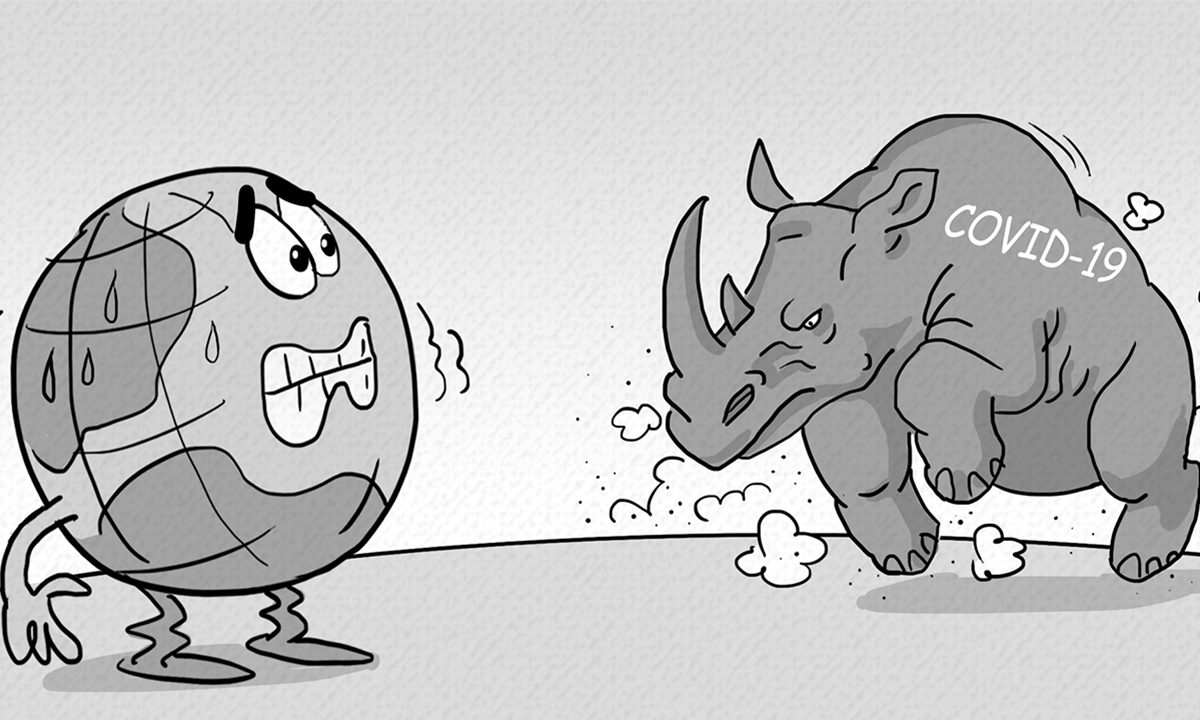Will coronavirus bring world to dark age?

Illustration: Liu Rui/GT
When the novel coronavirus broke out about five months ago, people thought the virus would be something like SARS - a terrifying infectious disease that hit them hard in 2003. It was unthinkable for almost everyone that COVID-19 would become such a severe pandemic.
As of press time, there have been over 10 million confirmed cases of COVID-19 around the world with more than 501,000 deaths. As a comparison, a total of 8,098 people worldwide became sick with SARS during the 2003 outbreak, and 774 of them died. Moreover, due to some countries' loose handling of COVID-19, the downward inflection point in terms of worldwide cases has yet to come.
Over 200 types of candidate vaccines are under development globally. But they may not catch up with the mutations of the novel coronavirus, which now has over 10 different types. The pessimistic estimate is that 1 billion people could become infected with COVID-19 worldwide with up to 3.2 million deaths.
In addition, the pandemic has also triggered a global economic crisis that has severely hit industries from cinema to civil aviation. According to the International Monetary Fund, global growth is projected at -4.9 percent in 2020. Moreover, the World Bank envisions a 5.2 percent contraction in global GDP in 2020. The Organisation for Economic Cooperation and Development estimates that global economic activity will fall only 6 percent in 2020 if a second wave of infections is avoided. The world is faced with the largest recession since the World War II.
World trade is expected to fall by up to 32 percent this year, while foreign direct investment flows are likely to drop by 30 to 40 percent. And this could trigger new crises of debt, finance, energy, and food availability. Meanwhile, the world is undergoing social crisis. The pandemic is reshaping interstate relations, affecting regional integration and localization of supply chains. Border control has become a new normal for many countries. This will put limits on international exchanges, slow down and even halt production, not to mention harm trade and the already fragile globalization.
In 2020, over 200 million people worldwide might face the risk of unemployment and a sharp drop in income. Soaring unemployment rate have caused serious chaos and split in certain countries' society, including the race-related controversies in the US. So far, anti-racism protests have spread to many Western countries. The pandemic, unemployment rate, and civil rights movements are impacting these already fragile societies. Unemployment and social instability may lead to local wars and geopolitical conflicts. A worst social disorder since the end of the World War II may be occurring.
There is still very limited knowledge on viruses. If all of humanity cannot be united, we may encounter the darkest age in the history of human civilization. So far, the global fight against the pandemic is confronting three obstacles.
First, anti-scientism. Some people do not trust medicine and tend to believe that freedom is more important than their own lives. They refuse to wear masks and some even think the pandemic is merely influenza. The negligence of science is equivalent to the negligence of civilization.
Second, anti-globalism. Globalization suffering a shock excites anti-globalists. Some countries' governments are not only complying with their rising domestic populism, they are actively adopting protectionist trade policies, restricting immigration and visas and withdrawing from multiple international organizations and agreements. Yet the truth is no country can skirt around global issues including refugee crisis, climate change and pandemic like this.
Third, anti-cooperative actions. Behaviors like the US, such as publicly discrediting and attacking China, making China a scapegoat for its own mired response to COVID-19 in the US, announcing to cut off funding for the World Health Organization (WHO) - this has put more countries who are in need of the WHO in danger. The mind-set of putting one country in priority overlooks the common interests of all mankind.
Indeed, humanity has reached an unprecedented moment of crisis. We have to collaborate and unite to avoid entering a dark age.
The author is professor and executive dean of Chongyang Institute for Financial Studies at Renmin University of China, and executive director of China-US People-to-People Exchange Research Center. His latest book is Great Power's Long March Road. wangwen2013@ruc.edu.cn


